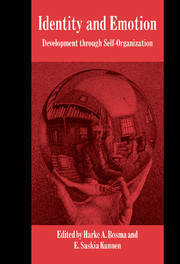Book contents
- Frontmatter
- Contents
- List of contributors
- Preface
- 1 Introduction
- 2 Developments in self-concept theory and research: affect, context, and variability
- Commentary: the self-concept is dead, long live … which construct or process? Differentiation and organization of self-related theories
- 3 The self and emotions
- Commentary: the self and emotions
- 4 Fish, foxes, and talking in the classroom: introducing dynamic systems concepts and approaches
- Commentary: fish, foxes, identity, and emotion
- 5 A relational perspective on the development of self and emotion
- Commentary: the personal experience of coherence
- 6 Affective processes in a multivoiced self
- Commentary: affective processes in a multivoiced self in action
- 7 Old–new answers and new-old questions for personality and emotion: a matter of complexity
- Commentary: emotions as sources of information about the self
- 8 Cognitive–emotional self-organization in personality development and personal identity
- Commentary: two faces of identity
- 9 A self-organizational approach to identity and emotions: an overview and implications
- References
- Author index
- Subject index
- Titles in the series
Commentary: the self-concept is dead, long live … which construct or process? Differentiation and organization of self-related theories
Published online by Cambridge University Press: 28 October 2009
- Frontmatter
- Contents
- List of contributors
- Preface
- 1 Introduction
- 2 Developments in self-concept theory and research: affect, context, and variability
- Commentary: the self-concept is dead, long live … which construct or process? Differentiation and organization of self-related theories
- 3 The self and emotions
- Commentary: the self and emotions
- 4 Fish, foxes, and talking in the classroom: introducing dynamic systems concepts and approaches
- Commentary: fish, foxes, identity, and emotion
- 5 A relational perspective on the development of self and emotion
- Commentary: the personal experience of coherence
- 6 Affective processes in a multivoiced self
- Commentary: affective processes in a multivoiced self in action
- 7 Old–new answers and new-old questions for personality and emotion: a matter of complexity
- Commentary: emotions as sources of information about the self
- 8 Cognitive–emotional self-organization in personality development and personal identity
- Commentary: two faces of identity
- 9 A self-organizational approach to identity and emotions: an overview and implications
- References
- Author index
- Subject index
- Titles in the series
Summary
In her chapter Van der Meulen organizes both theory and research on the “self-concept” around three key themes: cognition versus affect, interactions between self and context, and something termed “variability,” which can perhaps be characterized as a function of the former two plus motivation. This structure offers an excellent framework for the chapters that follow, where the specifics of these issues are taken up in some detail. At the same time, it appears that both the structure and the global nature of Van der Meulen's account illustrate the major tension in contemporary “self-concept” research: important aspects are studied in isolation, and yet few specifics are known. Given these themes, and all the relevant issues which surround them, how do we combine them into an integrated whole, whilst also seeking to specify the precise nature of the mechanisms involved? This is the task which the current volume invites us to embark upon and for which its authors “set the stage.” Van der Meulen provides us with a useful listing of key issues which prevents us from losing sight of the broader picture as we immerse ourselves in detailed discussions of specific aspects. Here, I wish to go one step further and tentatively suggest an initial framework, based on the argument that we need (a) clear definitions that distinguish between the “self-as-object” and the “self-as-subject”; (b) scope for several types of interactions between cognition and affect; and (c) clarity concerning what we understand as constituting “context” and where we position its boundaries.
The not-so-omnipotent self-concept
Van der Meulen makes a plea for clearer definitions of terms.
- Type
- Chapter
- Information
- Identity and EmotionDevelopment through Self-Organization, pp. 33 - 38Publisher: Cambridge University PressPrint publication year: 2001
- 3
- Cited by



